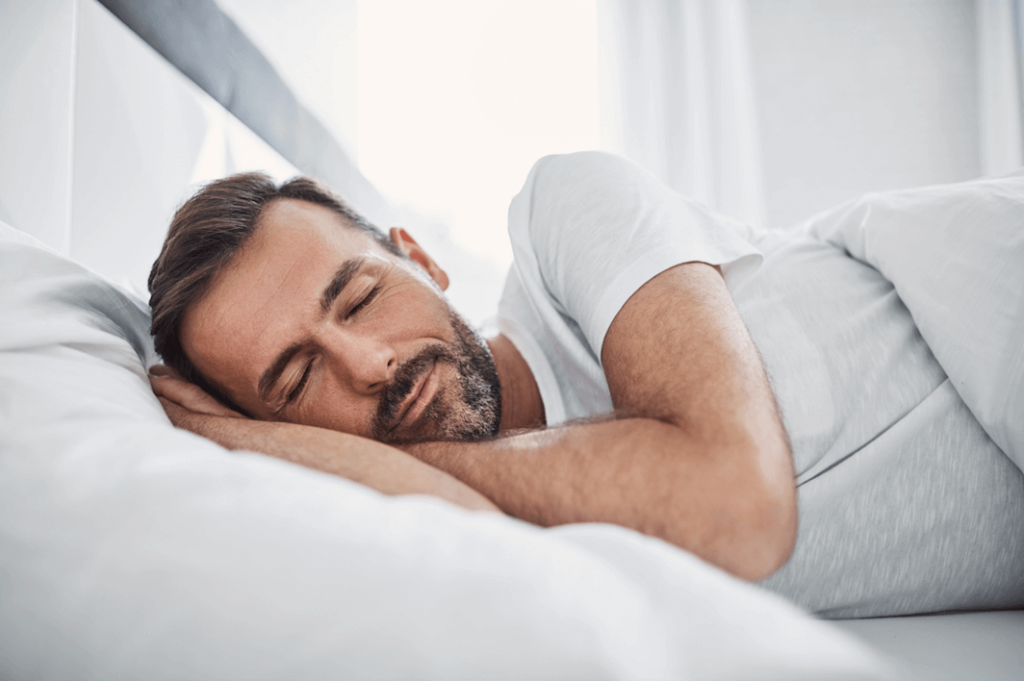Snoring and obstructive sleep apnea (OSA) are two of the most common sleep disorders. Dr. Morgan Chambers helps patients with snoring problems and sleep apnea in Lexington, KY. Although many don’t realize that a dentist can treat sleep apnea, it’s a common concern that Dr. Chambers knows all about.
Dr. Chambers can treat mild symptoms using oral appliances. An oral device can open the airway to prevent apneas. She will work with you to find the right treatment for your needs.

Symptoms of Sleep Apnea
Obstructive sleep apnea is a type of sleep-disordered breathing. It happens when your upper airway is repeatedly blocked during sleep. Doctors characterize it by loud snoring, choking or gasping for air during sleep, and excessive daytime sleepiness.
Other signs and symptoms include dry mouth, insomnia, morning headaches, and memory and attention problems. Seek medical advice as soon as possible when you notice any of these symptoms. The most common signs of sleep apnea include the following:
- Excessive daytime sleepiness
- Loud snoring
- Gasping while sleeping
- Dry mouth
- Frequent waking up at night
- Morning headaches
- Problems with concentration
- Trouble staying asleep
It can also lead to high blood pressure and heart problems in severe cases. If you or a loved one snores, discuss it with Dr. Chambers at your next visit. Treating a sleep disorder can improve the health of both the patient and those bothered by their snoring.
The Connection Between Sleep Apnea and Heart Health
Not only can sleep apnea ruin your sleep, but it can also be a major health concern. Snoring and sleep apnea may indicate more serious health issues like heart problems, high blood pressure, diabetes, and other diseases. These conditions can mess up your sleep and greatly impact your overall health.
Untreated obstructive sleep apnea (OSA) can greatly increase the risk of having a stroke, heart attack, or other heart issues. When people have OSA, they stop breathing hundreds of times over and over during the night. These breathing pauses cut down the oxygen going to organs like the brain and heart. This makes the heart work harder, which can lead to problems like clogged arteries and increases the risk of heart attacks and strokes.
How to Diagnose Obstructive Sleep Apnea
Diagnosing a sleep-related breathing disorder involves a team effort between your dentist, general physician, and other specialists. We’ll have to do some scans like digital X-rays to check the airway and see if it’s blocked. Our team might also ask for a sleep study to see how well you sleep. You can complete this study at home or at a sleep specialist’s office.
The findings of a sleep study can show if someone has OSA. These studies measure heart rate, breathing patterns, and oxygen levels while sleeping. They give us important information about how someone sleeps. They study helps us spot OSA and make life better for our patients with the condition.
Dr. Chambers will recommend a treatment plan after she determines that you have OSA. Treatment plans may include lifestyle modifications, weight loss, oral appliances, and continuous positive airway pressure (CPAP).

Treating Snoring and Sleep Apnea in Lexington, KY
Snoring and sleep apnea can really hurt your quality of life. But don’t worry, there are plenty of treatments out there to help you out. Whether it’s changing up your habits or trying out some medical options, there are lots of ways to finally get a good night’s sleep.
CPAP machines are the traditional method for treating sleep apnea. However, these machines are often loud, bulky, and uncomfortable.
Dr. Chambers offers oral appliance therapy to address snoring complications and reduce health risks. An oral appliance gently moves your jaw slightly to keep the air flowing through your upper airway.
The device itself looks like a mouthguard. You will only wear it during sleep to support your jaw throughout the night. Dr. Chambers creates custom-fit oral appliances so there is no worry of it falling out during sleep. Sleep appliances are small, portable, and much more comfortable to wear compared to CPAP machines.
You don’t have to try to sleep with a bulky mask over your face with these appliances. Oral appliances are a comfortable and efficient way to treat mild sleep apnea.
Sleep Apnea FAQs
Sleep apnea is a serious medical condition that can cause a person to stop breathing during sleep. Read our list of common questions below to help you understand the condition better.
How Long are Sleep Apnea Studies?
Depending on the type and complexity, these studies can be short-term or long-term. On average, it can take 9 to 10 hours to complete a sleep study. The physical time that it takes to collect data is around 6 hours. A doctor might check in after a year to see how long the treatment is working and if you’re experiencing any side effects.
What Are the Negative Effects of Sleep Apnea?
Sleep apnea can have many negative effects on patients. It can affect your quality of sleep, which ultimately affects your overall quality of life. Without treatment, this problem can increase blood pressure.
It can also increase your chances of having a stroke, heart failure, or heart attack. Some other immediate effects are headaches, irritability, and difficulty working and focusing.
Do I Have Sleep Apnea if I Snore?
No, just because you snore does not mean you also have sleep apnea. Snoring is the sound that occurs when air flows passes the tissues in your throat. You can snore and not have sleep apnea.
However, snoring can be a symptom of sleep apnea. If you have other symptoms like difficulty staying asleep, daytime sleepiness, or fatigue, it may be time to get checked.
Do Oral Devices Work for Sleep Apnea?
Dentists were the first to start offering oral devices for OSA and snoring. Many people don’t like using CPAP machines because they can be awkward and uncomfortable to sleep with. Luckily, the devices made by your dentist work well and are much easier to wear.

How Does Weight Affect Sleep Apnea?
Weight can affect sleep apnea because extra weight, especially around the neck and throat, can make it harder to breathe while you sleep. This can block or narrow the airway, which can lead to or worsen sleep apnea.
Losing weight can help improve sleep apnea by reducing the pressure on your airway and making breathing easier at night. Talk to your doctor for advice and support if you think weight might be affecting your sleep.
How Does Gender Affect Sleep Apnea?
Gender can affect sleep apnea in different ways. Generally, men are more likely to have sleep apnea than women. Women can still have sleep apnea if they are overweight, pregnant, or going through menopause.
Women’s hormonal changes during menopause can increase their risk of sleep apnea. If you notice signs of sleep apnea, get in touch with us for care as both men and women might have different symptoms.
Can Sleep Position Impact Sleep Apnea?
Yes, your sleep position can impact sleep apnea. Sleeping on your back can make it worse because it can cause your tongue and soft tissues in the throat to block the airway.
Sleeping on your side is often the best way to sleep with this condition. It keeps the airway open and makes it easier to breathe. If you’re having trouble with sleep apnea, trying to sleep on your side might help improve your symptoms.
Can a Humidifier Help Sleep Apnea?
Yes, a humidifier can help with sleep apnea. It adds moisture to the air, making breathing easier and reducing irritation in your throat and nasal passages. This can be helpful if dry air makes your symptoms worse.
However, a humidifier alone won’t fully treat sleep apnea. Use it along with other treatments and talk to your doctor about the best ways to manage your symptoms.
Schedule a Consultation Today
Treat obstructive sleep apnea in Lexington, KY with Dr. Morgan Chambers today. Call 859-251-3809 to schedule a worry-free consultation at Complete Dentistry For All Ages. You can also schedule an appointment online. Please let us know if you have more questions about your treatment options when you call.
